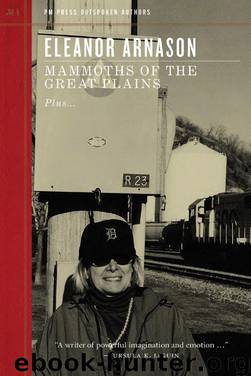Mammoths of the Great Plains by Eleanor Arnason

Author:Eleanor Arnason
Language: eng
Format: epub
ISBN: 9781604863826
Publisher: PM Press
WRITING SCIENCE FICTION
DURING WORLD WAR THREE
This essay began as a guest of honor speech, which I gave at Wiscon in 2004. I updated it a year later when the speech was published in Ordinary People , a collection of my writing. I am updating it again, because history keeps happening.
I’m going to start with some ideas from Immanuel Wallerstein, a sociologist who has clearly been influenced by Marxism, though I don’t know if he would call himself a Marxist.1
According to Wallerstein, we are living within a political and economic system which originated in Europe about five hundred years ago but is now worldwide. Politically this system is characterized by nation states. Its economic form is capitalism.
Wallerstein believes this world system is now in crisis, a crisis from which it will not recover. I’m not sure I entirely agree with his reasons for the economic crisis, though I do agree that capitalism is in trouble.
What I find interesting is Wallerstein’s analysis of what’s happening to nation states.
First, he argues that capitalism—for all that capitalist thinkers thunder against government interference— needs national governments. Nation states provide capitalists with protection in the form of patents, copyrights, tariffs and armies. They create an infrastructure which capitalists may not want to build themselves, but are happy to use. Examples in the U.S. are the railroads, funded by huge government land grants; the interstate highway system, built during the Cold War with tax money; and the Mississippi River, which the Army Corps of Engineers has turned into a barge canal. I have spent my life on the Mississippi. A lot of freight gets moved along it and through the St. Lawrence Seaway, another government project.
Nation states fund R&D, turning the results over to manufacturers under cost or for free. They funnel large amounts of money into specific industries, such as war industries. And they control what were called in the 19th century ‘the dangerous classes’—poor and working people. Part of this control is direct, through cops and prisons. But the so-called advanced or western nations also provide services—education, health care, pensions—which make life more tolerable and citizens less desperate.
Finally, nation states provide hope, which Wallerstein argues may be their most effective form of control. For more than two hundred years, since the English and American and French revolutions, people have seen the possibility of using national governments to improve their lives, sometimes through revolution, more often through the expansion of suffrage, the creation of political coalitions and the making of laws.
This era—when people hoped to make a better future by gaining control of the state through election or revolution—ended in the late 20th century, according to Wallerstein. By this time, Russia and China had demonstrated that ‘Communist’ states did not provide people with peace, justice and freedom. 2 The Social Democratic states of Western Europe demonstrated that elected socialists were unable to deliver on the promises of socialism. And the postcolonial states of Asia, Africa and Latin America failed to achieve humane postcolonial societies. Nations of
Download
This site does not store any files on its server. We only index and link to content provided by other sites. Please contact the content providers to delete copyright contents if any and email us, we'll remove relevant links or contents immediately.
We Ride Upon Sticks by Quan Barry(34483)
The Secret History by Donna Tartt(18951)
Norse Mythology by Gaiman Neil(13281)
Crooked Kingdom: Book 2 (Six of Crows) by Bardugo Leigh(12261)
The Betrayed by Igor Ljubuncic(11828)
The Betrayed by Matthew Dickerson(11600)
Caraval Series, Book 1 by Stephanie Garber(10219)
Year One by Nora Roberts(9745)
Oathbringer by Brandon Sanderson(9575)
Twilight Siege: A Dark Fantasy Novel (The Fae Games Book 2) by Jill Ramsower(9525)
The Priory of the Orange Tree by Samantha Shannon(8997)
The City of Brass by S. A. Chakraborty(8818)
Red Rising by Pierce Brown(8689)
Confessions of an Ugly Stepsister by Gregory Maguire(7851)
Little Fires Everywhere by Celeste Ng(7152)
This Is How You Lose Her by Junot Diaz(6836)
Shalador's Lady by Anne Bishop(6820)
Storm and Silence by Robert Thier(6799)
Shadows Of The Apt [01] - Empire in Black and Gold by Adrian Tchaikovsky(6670)
